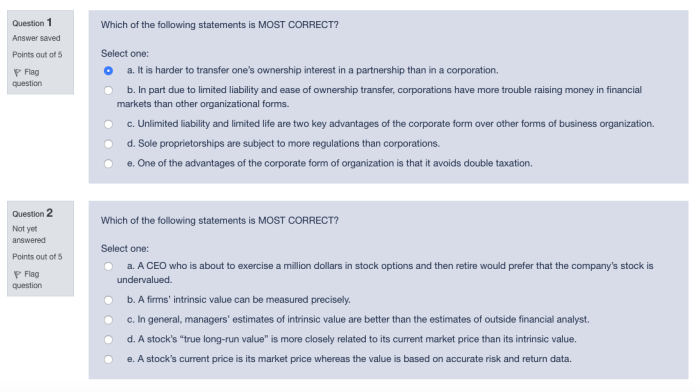Which one of the following statements is accurate? This fundamental question lies at the heart of discerning truth from falsehood, and its implications extend far beyond mere semantics. Identifying accurate statements is essential for informed decision-making, scientific progress, and the pursuit of knowledge in all its forms.
In an era marked by an abundance of information, the ability to distinguish between accurate and inaccurate statements has become increasingly crucial. This guide provides a comprehensive framework for evaluating the accuracy of statements, empowering individuals to navigate the complex landscape of information with confidence.
Which One of the Following Statements is Accurate?

Identifying accurate statements is crucial for making informed decisions and advancing knowledge. It involves examining the credibility of sources, verifying information, and evaluating the validity of claims.
Identifying Accuracy
Accuracy is determined by:
- Truthfulness:Conforms to objective reality.
- Reliability:Consistent and supported by evidence.
- Completeness:Provides a comprehensive and unbiased view.
- Relevance:Pertinent to the topic at hand.
Information can be verified through:
- Source credibility:Reputation, expertise, and transparency.
- Fact-checking:Corroborating information from multiple sources.
- Peer review:Evaluation by experts in the field.
- Logical reasoning:Analyzing the validity of arguments.
Analyzing Statements
To analyze statement accuracy:
- Examine the source:Consider its credibility and biases.
- Verify the evidence:Check the accuracy and reliability of supporting data.
- Evaluate the reasoning:Assess the logical validity of arguments and conclusions.
- Compare with other sources:Seek corroboration or contradictions from reputable sources.
Examples and Scenarios, Which one of the following statements is accurate
Accurate statement:“The Earth is round.”
Inaccurate statement:“The Earth is flat.”
Scenario:Relying on inaccurate information about medical treatments can lead to harmful consequences.
Applications and Implications
Accurate information is essential in:
- Science:Developing theories and advancing knowledge.
- Decision-making:Making informed choices in personal, business, and policy contexts.
- Education:Providing reliable knowledge to students.
- Journalism:Reporting accurate news and information to the public.
Relying on inaccurate information can have serious consequences:
- Misguided decisions:Based on false or incomplete information.
- Harm to individuals:Incorrect medical advice or financial scams.
- Social division:Spread of misinformation and polarization.
FAQ Resource
What are the key criteria for determining the accuracy of a statement?
Accuracy is contingent upon several key criteria, including: consistency with established facts, logical coherence, empirical evidence, and the credibility of the source.
How can I verify the reliability of information?
To verify the reliability of information, consider factors such as the source’s reputation, the presence of corroborating evidence, the absence of bias, and the adherence to recognized standards of research and reporting.

